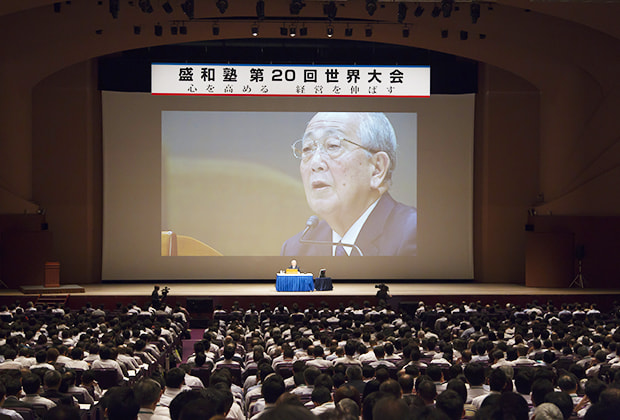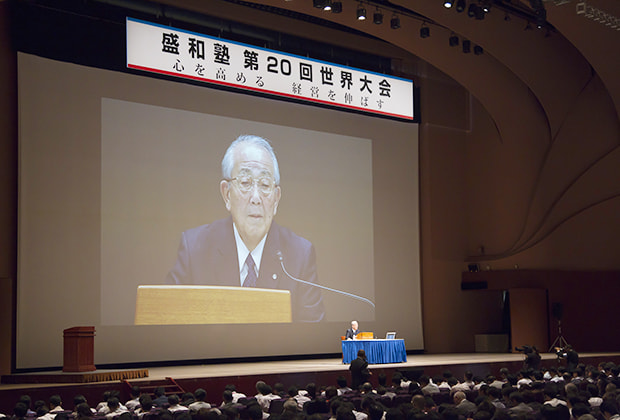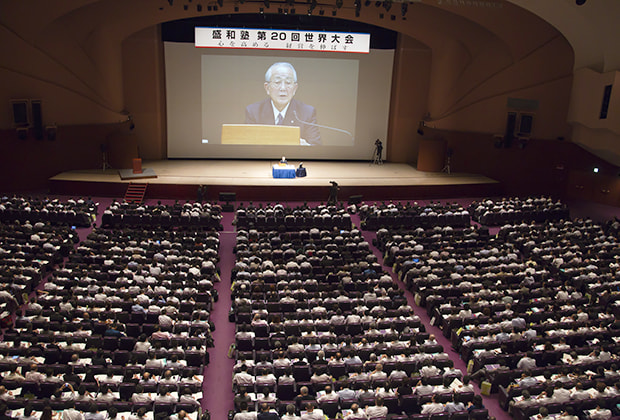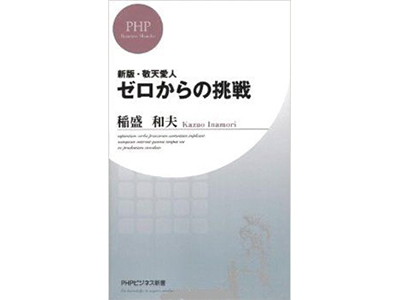Lectures
What Guides People and Enterprises Toward Growth and Development?―The Real Factors Behind Reconstruction of Japan Airlines / The Regeneration of Japan's Economy―

How did Japan Airlines achieve its revival? Prior to its September 2012 re-listing as a publicly traded company, during the 20th Seiwajyuku World Convention in July of that year, Inamori addressed the true reasons behind JAL's revival. At the same time, he addressed more than 4,000 Seiwajyuku students, all business managers, about possessing a noble and intense fighting spirit to lead an enterprise to growth.
This lecture is included in the book Selected Lectures on Management, by Kazuo Inamori, Vol. 6: The Essence of Corporate Management.
The turnaround of Japan Airlines
Japan Airlines (JAL) has achieved an outstanding recovery. After many years of entanglement with serious operational problems, it had become a great untidy mess that nobody could unravel. Everyone believed secondary bankruptcy was inevitable. Why did the resurrection of this failed enterprise proceed so steadily?
Reforming awareness through the Philosophy
Thinking back, the first factor was the wonderful power of the Philosophy. I believed that reconstructing a company like Japan Airlines would require, first of all, a change of attitude throughout the work force. Reforming employee awareness and attitudes was imperative. Using the Kyocera Philosophy, a philosophy I had drawn out of business experience over more than half a century, I preached earnestly to JAL's executives, appealing to them to change their thinking and see things in terms of an ideal vision. Leaders must have the kind of outstanding human character that elicits respect from others. The only way to achieve this is by working continually, day after day, to elevate one's mind. I took JAL employees through intensive study of these concepts, even as far as to propose an ideal way to live as a human being.
We also implemented an education effort throughout the general work force. Without a change of awareness among employees who had immediate contact with customers at the front lines of the workplace, the airline would never improve. I therefore visited the workplace locations and spoke directly with employees.
Through efforts like these, after being appointed chairman of Japan Airlines, I worked to reform the awareness of all employees, starting with executives, and endeavored to rebuild the company's organizational culture. The subsequent transformation of awareness was accompanied by a dramatic recovery in business performance.
Rebuilding the organization through Amoeba Management
Rebuilding the organization through Amoeba Management also proved very effective. In my view, to achieve stable operations in an airline, a mechanism for understanding the profitability of individual routes and flights is essential ― in short, a management accounting system. I therefore worked on building such a system. Amoeba Management is an original system I had put together at Kyocera. I set about rearranging the system so it could be applied just as effectively by an airline. As a result, information on the profitability of all JAL routes and flights now becomes available the following day. We established a finely detailed management accounting system, unmatched by any other airline in the world.
In other words, JAL executives and employees experienced a transformation of awareness. As well, the new organization and accounting structures gave them new ways to apply their creativity while they worked, based on real-time awareness of their results as shown by the management accounting system.
Figures for each department would be presented over three days during a management meeting held each month. While listening to the presentations, I offered management guidance, suggesting to the presenters what I believed their departments should be doing, and giving instructions on the next steps to take as leaders.
Introducing this profit management system stimulated greater profit awareness among employees, and led to fundamental changes in the organizational climate. This led to significant improvement in the management of Japan Airlines.
"Divine Help" for a pure mind

Japan Airlines experienced a magnificent revival because the Kyocera Philosophy led to a transformation of awareness throughout the workforce, and the organization was rebuilt with Amoeba Management. Thinking more deeply about it, though, it seemed to me these were not the only reasons for success.
Based on a mindset of gratitude, I have endeavored to "Serve the greater good of society and humankind" in my personal life and business management. During the revival of Japan Airlines, too, I was never motivated by any personal reward. We simply did everything possible to move forward. I tend to feel that, on seeing the heroic attitude of everyone involved, God, the heavens, or nature extended a helping hand. That is to say, the revival of Japan Airlines did not result from my actions. Rather, it seems to have resulted from a Divine intervention. Were it not so, such a miraculous recovery would surely not have been possible. Rather than human strength, there must have been support from some supreme source that can only be referred to as Something Great. I tend to think this gave us the impetus and guided us through the revival of Japan Airlines.
Instead of relying on your own powers alone, I invite you to do business and live your life as if you had the support of some grand existence that governs all things, and in a way that is attuned with the will of the universe. By engaging in business and living life with a beautiful, pure and righteous mind, Divine help, or Providence, will unfailingly be there for you.
The combative mentality required by a manager
Make no mistake here. To be sure, whether in the revival of Japan Airlines or elsewhere, elevating the mind helped to produce outstanding results. Even so, this is not a discussion of simply needing to have a pure mind. It is of course necessary for the manager to study the Philosophy, thereby elevating the mind, and becoming a better person. However, that is not all there is to business management. A gentle and pure mind by itself is lacking in the strong spirit needed to face the rigors of producing profit and dealing with economic downturns. Without such a strong spirit, growing and developing a corporation will be all the more difficult.
Being a genial person is therefore by itself not enough for management. You must have the tremendous spirit to do whatever is needed to raise sales and secure a profit, even in the midst of a grinding recession. This applies not just to managing a single enterprise, but equally to the revival of the Japanese economy, which has been beset by a sense of stagnation. To break out of the circumstances currently enveloping Japan and return to the path of growth, individual managers must possess an intensely combative mentality.
In particular, I urge you, as managers of small or medium-sized enterprises and members of Seiwajyuku, to be fired up with a combative mentality as you run your operations. You might ask, "Why?" Even amid the scorched earth that followed wartime defeat, business operators fired up with indomitable and undaunted spirit put every effort into developing their companies. Those founding managers, who dedicated themselves to reconstructing Japan's economy, all started out as managers of small and medium-sized businesses. With a fierce fighting spirit, they dragged their companies forward, striving at the leading edge of Japan's industries. Once more, Japan must create a vibrant society in which small and medium-sized enterprises produce many managers of such caliber.
Seiwajyuku students are aware of the need for a pure mind in management, and are striving day by day to make it a part of themselves. When you have such an intense and fiercely combative mentality, I believe a pure mind becomes a compass that can help you advance in the right direction.
Notable Quotes from This Lecture

Here are some excerpts from what Inamori expressed in this lecture.
If you hope to run an outstanding business, as a manager you must first elevate your mind. I have expressed this as 'Elevate your mind and expand your business,' and have continually expounded on what this means.
As a business operator, you must think about what is good and act for the good, to the extent that you become able to influence and change not only direct employees, but everyone involved with the company. In so doing, it will inevitably come around, returning to you in one form or another. This is a universal truth.
Management is a matter of 'will.' You need a strong will that holds fast to a decision to reach any particular state or goal. Therefore, even if you prepare a Master Plan [an annual plan], or set monthly targets, you will have failed as a leader if you are unable to reach them.
A pure mind which considers other people is essential. However, with only these elements, the enterprise will be defeated and weeded out by market competition. On a larger scale, nations also can decline amid global competition. Times are changing dramatically, and the economic environment is shifting extremely quickly. Precisely because we are in the midst of such a chaotic environment, we must not allow ourselves to be carried away by circumstances. We need the strong spirit to pick ourselves up again, whatever the environment may throw at us. In short, we must have a 'Combative Mentality.'
People who understand the need for a pure mind in business, and strive to attain that state as they work day by day, will never go down the wrong path in management or life, if they also have an intense and fiercely combative mentality. The pure mind becomes the compass, enabling them to proceed straight along the right path.
From the 20th Seiwajyuku World Convention (July 19, 2012)
 Selected Lectures on Management, by Kazuo Inamori,
Selected Lectures on Management, by Kazuo Inamori, 